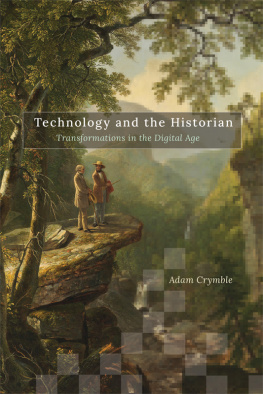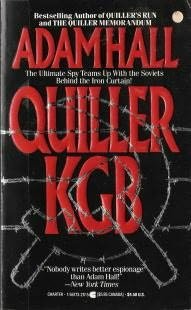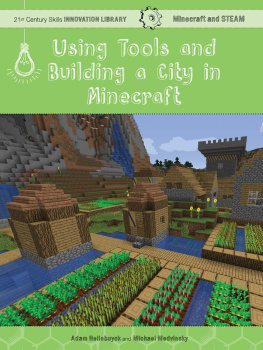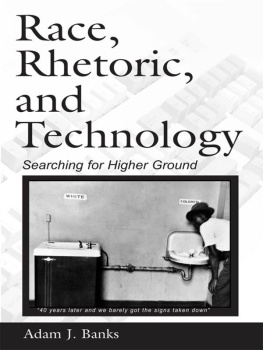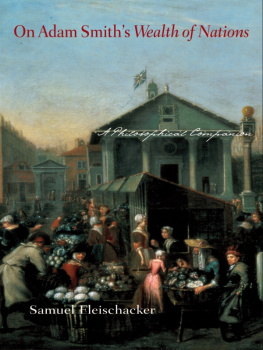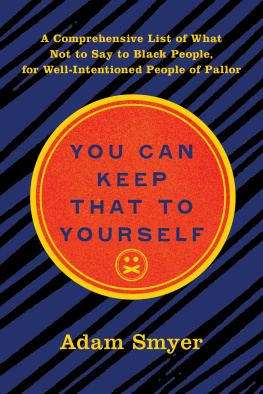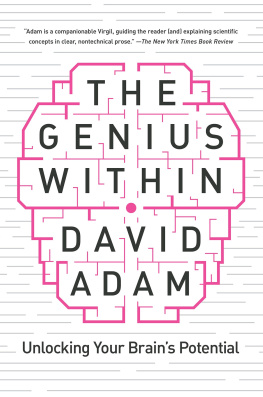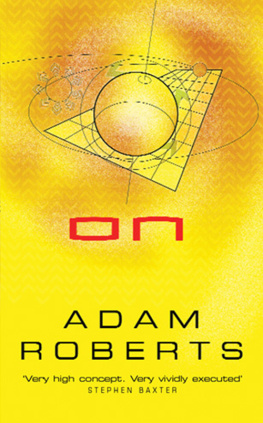Technology and the HistorianTOPICS IN THE DIGITAL HUMANITIES
Humanities computing is redefining basic principles about research and publication. An influx of new, vibrant, and diverse communities of practitioners recognizes that computer applications are subject to continual innovation and reappraisal. This series publishes books that demonstrate the new questions, methods, and results arising in the digital humanities .
Series Editor
Susan Schreibman
Technology
and the Historian
Transformations in the Digital Age
ADAM CRYMBLE
2021 by the Board of Trustees
of the University of Illinois
All rights reserved
Library of Congress Cataloging-in-Publication Data
Names: Crymble, Adam, author.
Title: Technology and the historian : transformations in the digital age / Adam Crymble.
Description: Urbana : University of Illinois Press, 2021. | Series: Topics in the digital humanities | Includes bibliographical references and index.
Identifiers: LCCN 2020036208 (print) | LCCN 2020036209 (ebook) | ISBN 9780252043710 (cloth ; acid-free paper) | ISBN 9780252085697 (paperback ; acid-free paper) | ISBN 9780252052606 (ebook)
Subjects: LCSH : HistoryComputer network resources. | HistoryResearchMethodology. | HistoriographyMethodology. | Digital media.
Classification: LCC D 16.117 . C 79 2021 (print) | LCC D 16.117 (ebook) | ddc 902.85/4678dc23
LC record available at https://lccn.loc.gov/2020036208
LC ebook record available at https://lccn.loc.gov/2020036209
To everyone who has contributed to Programming Historian
Contents
Acknowledgments
I am grateful to Katrina Navickas, who read through every chapter, to my reviewers and editors, as well as to Sarah Lloyd, James Baker, Michelle Hamilton, Jane Winters, Angela Kedgley, and Ellen Crymble, who provided valuable comments and helped me ground the book more effectively in the existing scholarship.
I also thank those scholars who contributed time, resources, or agreed to be interviewed: Josh Greenberg, Rob MacDougal, Roopika Risam, Amanda French, William J. Turkel, Willard McCarty, Stephen Brier, Steven Mintz, Edward Ayers, Kelly Schrum, Chad Gaffield, Janice Reiff, William Cutler, Harold Short, Tim Hitchcock, Alan MacEachern, John Styles, James Baker, Franois Dominic Larame, Sasha Hoffman, Lisa Smith, Bob Nicholson, Sharon Leon, Justin Colson, Arthur Burns, Scott Weingart, Patrick Walsh, Sharon Howard, Alix Green, Ceri Houlbrook, Mills Kelly, the Programming Historian team, and Mike Cosgrave, who gave me a virtual tour of his digital teaching space.
Finally, my father, Hugh Crymble, and grandfather Sam Crymble, who introduced me to computers in the 1980s and helped spark a curiosity that inspired this work.
Technology and the Historian
INTRODUCTION
My purpose here, said Roy Rosenzweig in 1997 is to remind us that we are engaged in a process that has earlier roots and precedents as well as one that respondsas did these earlier effortsto particular historical circumstances. A celebrated digital historian, Rosenzweig sadly passed away during his creative prime. This speech a decade before his death addressed an audience of fellow historians in the United States, asking if and in what ways the U.S. history course should be revised for a new millennium. It seemed fitting that a such an apt statement about the future of the profession from one of digital historys most important voices should find a home here at the beginning of this book, which uncovers how technology has influenced practitioners of historical studies in the information age, reminding us that it too was part of a process with earlier roots and the product of particular historical circumstances.
This is a story that needs telling now because no discipline has invested more energy and thought into making its sources and evidence publicly available, or in engaging publics through digital mediums, or transforming their pedagogic practices with the help of technology. Yet the stereotypical historian still remains resolutely tied to scholarly traditionsdust in the archives rather than bytes in the computers memory. How then, did a field with some of the most severe barriers to change come to claim a greater piece of the forward-looking digital pie than perhaps any other discipline, and why do the dominant narratives of the profession continue to remember otherwise?
Yet in a field so quick to point out why it is important for us to have a deep knowledge of the past, historians have been slow to recognize how their work and their ideas have not been immune to the transformative rise of the computer, which has brought about the greatest social and cultural transformation the world has perhaps ever seen.
As we increasingly work with computers, computers will increasingly exert their influence on our intellectual agenda, and so we must understand both their strengths and the limits they impose on us. This book challenges our professional blind spot by putting technology at the center of the fields own narrative for the first time, providing a history of technologys impact on historical studies. In doing so, it pulls together the histories and philosophies of the field, with a genre of works including books, articles, and blog posts, that is probably best known as digital history scholarship but can better be described as works for historians about computers, intended for immediate consumption.
These books by historians for historians, ranging from Edward Shorters The Historian and the Computer: A Practical Guide (1971), to Peter Denley and Deian Hopkins History and Computing (1987), to Shawn Graham, Ian Milligan, and Scott Weingarts Exploring Big Historical Data (2016), were written to summarize the state of a field forging ahead into a bright future. Written by historians, they tended not to speak to the histories and philosophies of the field. Like de Groots contribution, they often became dated within a few years because they failed to position themselves within a longer history. In many cases, and particularly after about the year 2000, it would seem that their authors were not even all that aware ofcertainly not that bothered bythe idea that the computer and the historian had a history together worth remembering. Instead, they spent so much time squinting toward the bright future on the horizon that they forgot to turn around and understand from where they had come and how understanding their intellectual roots could give focus to their energy. The result was a technologically adept group of historians operating in an eternal present, both ignoring and being ignored by the histories of the field of which they should have been a part.
This blind spot of digitally inclined scholars toward their own past has been noticed before. As historian of Latin America Chad Black noted in 2010, practitioners interested in both history and computers too rarely had a sense of the fields trajectory and thus avowed novelty, unaware that the same points may have been debated in the 1980s, if not before.
In a society that has tended to discard old technology rather than celebrate it, old ideas were shed simply because they were old. Teaching in the digital history classrooms of the new millennium overwhelmingly turned its back on anything published more than a few years earlier. Many of the typical syllabi of the 2010s were nearly bereft of the scholarly debates from the twentieth century, ensuring that the problem highlighted by Black and Nowviskie would continue into the future. Instead, readings tended to focus on practical matters related to doing work right now.of their intellectual value more than half a century after they were published and were thus still worthwhile reading. Yet, when it came to technological expertise, it would seem there was less pressure to understand the decades of scholarship that preceded ones own time of study, and instead it was often enough to master the approaches of today.


